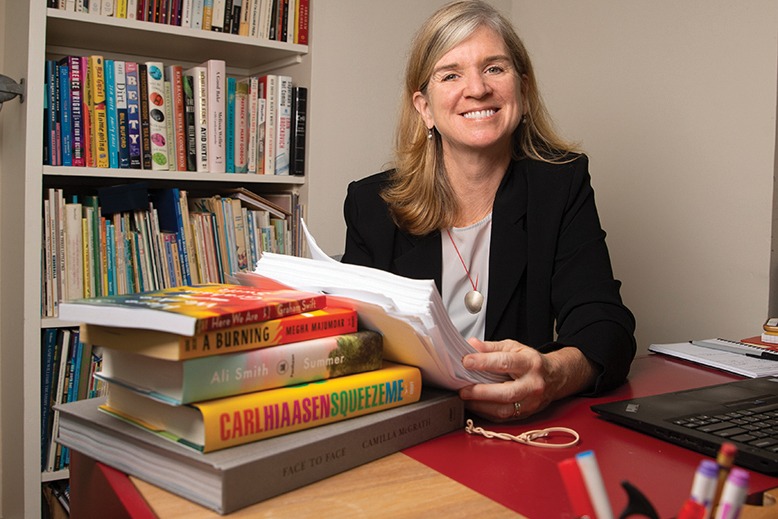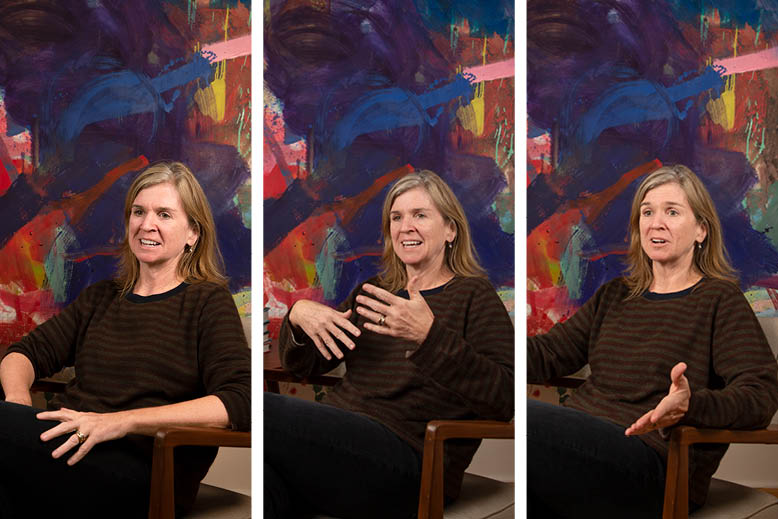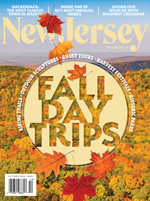
Just weeks after she was named publisher and executive VP of Alfred A. Knopf, the coronavirus forced Reagan Arthur and her team to their home offices. Photo by Fred R. Conrad
Reagan Arthur was never one of those New Yorkers who looked down their noses at the suburbs. But that is not to say the publisher and executive vice president of Alfred A. Knopf, the company that introduced the world to literary stars like Toni Morrison and Gabriel García Márquez, didn’t take a minute to find her stride when she moved to Montclair from Brooklyn.
“When we first got here, I tried to be a PTA mom,” she says of her initiation to New Jersey. “That was not for me. I thought, I need to do this for my kids, but then I found myself flailing at it. Like, I would miss the PTA newsletter deadline. I finally woke up to the fact that there are moms who are really good at that, who have an energy and talent for it I don’t.”
Fortunately, Arthur had already figured out what she does have the energy and talent for: publishing writers of influence with clear, strong voices and powerful stories. Joshua Ferris, Ronan Farrow and Sherman Alexie owe their literary reputations to Arthur; so do writers outside the literary category, like the mega-selling thriller writer James Patterson. Books by Tina Fey, David Sedaris and romance writer Elin Hilderbrand likewise made it past the galley stage only after they got the Arthur thumbs-up.
A visit to her home, where giant abstract paintings keep company with sofas shed on by Maggie, the family’s charming mutt, feels more like stopping in on a favorite neighbor than taking a meeting with a publishing powerhouse. But it would not be wrong to call her the latter. Arthur is only the fourth person to run Knopf in its 105-year history, and the first woman. Before her legendary predecessor, Sonny Mehta, died in December 2019, he left word that she was his pick to take the helm.
Arthur, 56, was born in Stony Brook, New York, and moved to the San Fernando Valley with her parents and brother just after kindergarten. Her father was an English professor at California State University’s Northridge campus. Her mother, drawn to plants, worked in nurseries and garden centers. A life of quiet contemplation seemed her birthright. She wasn’t the rebellious type.
“My mom and dad were both big readers,” she says. “On family vacations, we’d sit on the banks of whatever body of water we were visiting and read silently.” Beverly Cleary and Judy Blume appealed, but so did almost anything else she could get her hands on. “I took whatever was on my parents’ shelves. At 12, I got into the memoir of Rose F. Kennedy. I must have read that book three times. I was fascinated.” As an adolescent, Arthur picked up Sylvia Plath’s harrowing novel The Bell Jar, which she says she read way too young.
At UCLA, Arthur thought she wanted to go into advertising and figured she would major in communications. Then she took an English class. “You can’t fight the feeling,” she says. Books started to seem like a calling, but California wasn’t the place to start a career in publishing.
***
After graduation in 1986, Arthur spent a year working at a Paris bookshop. Then she moved to New York where, through a classified ad, she found an editorial assistant job at St. Martin’s Press. Her starting salary of $15,000 a year required her to moonlight in desktop publishing and to choose between buying a cup of coffee or the New York Times—both purchases on a single day would have blown her budget. But by then, she was hearing the siren song that lures all publishers.
“I would go into a meeting and they would be talking about a particular book they wanted to buy,” she says. Just being in the room for such discussions was intoxicating. After a year at St. Martin’s Press, her boss gave her license to buy her first few books. None were hits, but “my boss was generous that way, and I think when someone gives you a chance, that’s a large part of how you become successful.”
Arthur left St. Martin’s for a job as a senior editor at Little, Brown in 2001, the same year she and her husband, Scott Beck, a former children’s book author and illustrator and now an abstract and figurative painter, moved to Montclair from Park Slope. Their daughter, Nell Beck, was barely two; their son, Duncan Beck, had not yet turned one. The same day she got the Little, Brown job offer, they lost the lease on their apartment.
“It was a hectic time,” Arthur says. “We threw both kids in the car and came out here, and it was a feeding frenzy.” Real estate, then as now, was booming. The colonial they still live in became theirs after a bidding war and failed offers on six other houses. But desperation for a place to live, more than any specific desire to be in Montclair, was driving them. “We liked it, but we didn’t know anybody out here. It was hard to pull the plug on Brooklyn.”

Photos by Fred R. Conrad
By the time she found herself flailing as a PTA mom, her star was rising at Little, Brown. Her boss, Michael Pietsch, gave her her own imprint, and that same year, Reagan Arthur Books was born. Through the imprint, she shepherded authors including Kate Atkinson onto readers’ shelves and got a chance to hang out with Fey on the set of 30 Rock. (Fey, she says, was as fun in person as the best-selling book they worked on together, Bossypants. However, Fey was extremely busy, “so it wasn’t like we were hanging out having mani-pedis.”) In 2013, after building a reputation as an arbiter of writers with strong voices and real storytelling chops, she was named Little, Brown’s VP and publisher.
Coming home to Montclair every night was a comfort. “Our neighbors are great, and there’s a variety of free tennis courts around town, and there’s so many cultural events,” she says. She and Beck subscribe to Montclair State’s Peak Performances, which she calls “incredible theater and dance for $20 a ticket.” And the literary events never get old. She loves that readings by the likes of Trevor Noah and Malcolm Gladwell aren’t hard to come by.
“There’s so many authors and writers and publishers and journalists and people who are interested in books here,” she says.
Arthur does her part to cultivate that interest by volunteering every year for the Montclair Literary Festival. “Reagan has been a huge supporter of authors and the literary festival in Montclair,” says Jacqueline Mroz, director of the festival, which just completed its fourth year. Arthur, she says, “recognizes the importance of reading and books in people’s lives and is always generous with her time and advice.”
***
Arthur started her job at Knopf in February after a painful goodbye at Little, Brown. “I was never planning to leave, and I wouldn’t have if this hadn’t come along,” she says. She hadn’t had time to figure out where the copy machine was before the coronavirus swept in, sending her colleagues scrambling out of Knopf’s Manhattan high rise and into their home offices.
“It’s been a challenge,” she says of getting to know people through Zoom. “But at the same time, it’s a challenge for all of us. We’re all in the same boat.” Arthur considers herself lucky to have what she calls “a big, messy house to spread out in.” It’s as roomy as it’s ever been, with Nell in Ohio for her senior year at Oberlin and Duncan preparing to head back for his sophomore year at Eckerd College in Florida.
[RELATED: How the Pandemic Is Altering Book Publishing]
Most days, Arthur is so busy taking meetings, she has to force herself to stop for lunch. “There’s a great gym here called Architect that’s moved to doing online classes,” she says. After a 6 am workout, she is on the job until early evening. Publishing books, including a new slate of titles at Knopf, still doesn’t feel like work. “We’re really excited to be working with the journalist Charles Finch, who’s doing a book called What Just Happened?, about 2020,” she says. She’s also looking forward to a new novel by Maggie Shipstead and a debut memoir, Nightcrawling, from Leila Mottley, a Black author who escaped a difficult upbringing in Oakland, California.
Publishing writers from diverse backgrounds has long been a priority, she says from her bright, well-stocked home library. But lately, she’s been just as tuned into fostering diversity in the publishing business.
“I think it’s safe to say that, across the industry, that’s the main thing we’re focusing on,” she says. “Thirty years ago, there was no one of color in my cohort. And we’re still very white.” Part of the problem is attracting talented, entry-level assistants willing to work for the low pay Arthur herself experienced when she was an editorial assistant. “It’s hard for people who don’t have some other source of income,” she says.
She accepts that significant change will take time. What she does not accept is complacency. That’s evident from her Twitter account, where she regularly weighs in on books and, more frequently, politics. Her name may refer to a president and a king, the reason Pietsch suggested she use it to launch her imprint, but she is no elitist.
“I think the reason I got my job was a combination of being supported by my assistants and my bosses,” she says. “But I know, there are days I ask myself, Why me? I’m grateful.”



